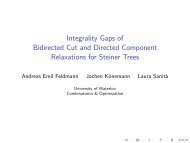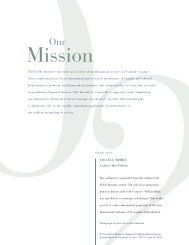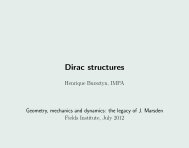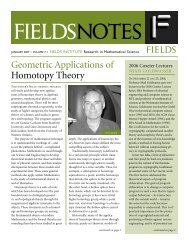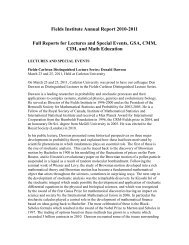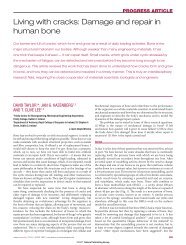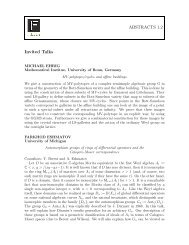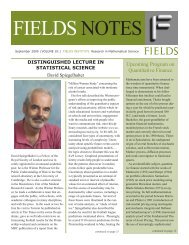Annual Report 2005 - Fields Institute - University of Toronto
Annual Report 2005 - Fields Institute - University of Toronto
Annual Report 2005 - Fields Institute - University of Toronto
You also want an ePaper? Increase the reach of your titles
YUMPU automatically turns print PDFs into web optimized ePapers that Google loves.
Lowell Aron<strong>of</strong>f (Cannex Financial Exchanges)<br />
An exchange for the Canadian and US payout annuity markets<br />
Garth Bernard (MetLife)<br />
Successful product innovation: taking concepts to market<br />
Paul Kaplan (Morningstar, Inc.)<br />
Asset allocation with annuities for retirement income management<br />
PRMIA Risk Management Seminars<br />
November 2004 – June <strong>2005</strong><br />
Held at the <strong>Fields</strong> <strong>Institute</strong> and the Rotman School <strong>of</strong> Management<br />
Organizers: Dan Rosen (Algorithmics) and Luis Seco (<strong>Toronto</strong>)<br />
The <strong>Fields</strong> <strong>Institute</strong> hosts two regular seminars with strong<br />
participation from the business community. The Quantitative<br />
Finance seminar has been in place for over ten years.<br />
It has a primarily academic focus, and draws its audience<br />
from groups ranging from mathematics and business<br />
faculty to financial pr<strong>of</strong>essionals. New in 2003-2004 was<br />
the PRMIA Risk Management seminar, which focuses more<br />
closely on the needs <strong>of</strong> practitioners. It built on that success<br />
with the 2004-<strong>2005</strong> seminar, which regularly left the <strong>Fields</strong><br />
lecture hall with standing room only. The seminar is organized<br />
by Dan Rosen (Algorithmics) and Luis Seco (Risklab,<br />
Sigma Analysis, and the <strong>University</strong> <strong>of</strong> <strong>Toronto</strong>), who are<br />
both <strong>of</strong>ficers <strong>of</strong> the <strong>Toronto</strong> chapter <strong>of</strong> PRMIA – the Pr<strong>of</strong>essional<br />
Risk Managers’ International Association. PRMIA<br />
is a nonpr<strong>of</strong>it pr<strong>of</strong>essional association that organizes risk<br />
management events and certification programs around the<br />
world.<br />
In November, the risk management seminar heard a panel<br />
discuss the 2002 Sarbanes-Oxley act (SOX 404), and its<br />
implications for risk management. SOX 404 is a reaction<br />
to the Enron and WorldCom scandals, and imposes legal<br />
obligations on CEOs and CFOs <strong>of</strong> US corporations to<br />
implement, test, and certify internal financial controls.<br />
Risk management enters into all three stages <strong>of</strong> this process,<br />
and the audience heard about the experience <strong>of</strong> various corporations<br />
with this. Building the necessary infrastructure is<br />
proving to be more complicated and costly than predicted,<br />
even though Canada will likely not adopt similar rules until<br />
2006.<br />
C o m m e r c i a l / I n d u s t r i a l M a t h e m a t i c s<br />
Jim McGovern, Ron Mock, Luis Seco, Bill Fung and Dan Rosen<br />
In February the seminar moved to the atrium <strong>of</strong> the Rotman<br />
School, where several hundred participants heard a<br />
presentation sponsored by SunGard Trading and Risk. John<br />
Hull (Rotman) discussed the structure <strong>of</strong> Collateralized<br />
Debt Obligations, in which a portfolio <strong>of</strong> debt obligations<br />
are combined and sold in tranches as a number <strong>of</strong> individual<br />
securities. He described the modeling and pricing<br />
<strong>of</strong> these CDO’s, and indicated how Gaussian copulas have<br />
emerged as the standard for modeling the codependence<br />
<strong>of</strong> default events in portfolios or baskets credit derivatives.<br />
Following Hull’s talk, a panel <strong>of</strong> discussants spoke about<br />
the evolution <strong>of</strong> the market for these products, and commented<br />
on a variety <strong>of</strong> associated risk factors.<br />
Suzanne Labarge, who recently retired as Vice-Chair<br />
and Chief Risk Officer at RBC financial group, gave the<br />
audience at <strong>Fields</strong> her perspective on the evolution <strong>of</strong><br />
risk management, at a seminar in March. She described<br />
the market’s increasing intolerance <strong>of</strong> poor risk management.<br />
This has led to better defined structures through<br />
which firms manage risk, among them the creation and<br />
recognition <strong>of</strong> such positions as Chief Risk Officer. Vanilla<br />
lending is no longer central – instead structured or illiquid<br />
products and international agreements such as Basel II have<br />
made risk management a key aspect <strong>of</strong> the operation <strong>of</strong> any<br />
modern bank.<br />
The seminar concluded in June, with a pair <strong>of</strong> talks on<br />
alternative investments, such as hedge funds. Ron Mock<br />
(Ontario Teachers’ Pension Plan) described the perspective<br />
<strong>of</strong> a practitioner, picking and choosing among a variety<br />
<strong>of</strong> alternative investments. The goal is to buy alpha – or a<br />
return uncorrelated with the rest <strong>of</strong> the market. He indicated<br />
some <strong>of</strong> the many pitfalls this entails, including the<br />
<strong>Fields</strong> <strong>Institute</strong> <strong>2005</strong> ANNUAL REPORT 109



